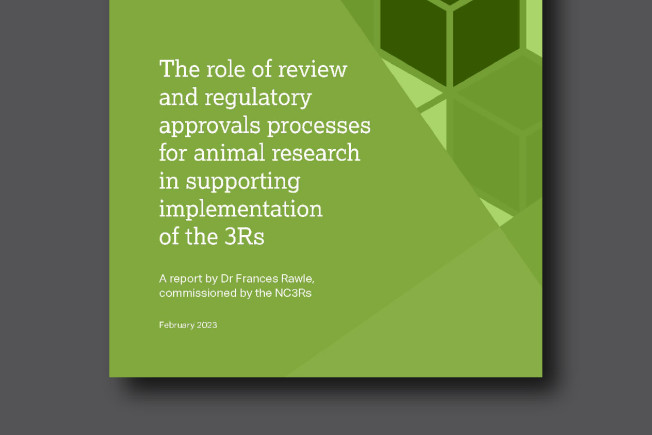The role of review and regulatory approvals processes for animal research in supporting implementation of the 3Rs (2023)

An independent report by Dr Frances Rawle, commissioned by the NC3Rs.
To understand how the system of checks and approvals for animal research could better promote the uptake of 3Rs approaches, the NC3Rs commissioned Dr Frances Rawle, former Director of Policy, Ethics and Governance at the MRC, to produce a detailed review of the current 3Rs landscape. Specifically, Frances was asked to:
- Map in detail what the various regulatory and review processes and bodies currently do to ensure compliance with 3Rs principles and to promote adoption of 3Rs advances.
- Identify any current variations in review processes, gaps (or overlaps) in coverage and lessons to be learned from examples of particularly effective practice.
- Explore opportunities for adjusting current processes and responsibilities to cover any gaps, remove unnecessary duplication and more effectively promote adoption of 3Rs advances.
Read our news item for further background and detail: New report on the 3Rs in animal research, 27 February 2023.
Download the report
FAQs
Frances has extensive experience of managing scientific peer review and of research policy, research ethics and governance throughout a long career at the Medical Research Council (MRC). Until her retirement in 2021, she was responsible for MRC’s policy on animal research. She is a previous member of the NC3Rs Board and was on the Steering Group for the Animals in Science Regulatory Unit (ASRU) Change programme in 2021/22. Frances now works as an independent consultant and her varied experience across the sector means she was uniquely placed to engage with the key stakeholders for this report.
Frances interviewed almost 40 stakeholders from across the sector. The current and former Head of the ASRU were interviewed at the start and towards the end of the project, in addition to former and current ASRU Inspectors, and members of the Animals in Science Committee (an independent advisory public body sponsored by the Home Office). ASRU also provided written responses.
Animal Welfare and Ethical Review Body (AWERB) chairs and members were interviewed and three AWERB meetings were observed. Named persons working under the Animals (Scientific Procedures) Act 1986, and senior scientists with experience as project licence (PPL) holders and/or reviewers on funding panels were consulted, in addition to representatives of funders from both the charitable and public sector. The full list of contributors is included in the report.
ASRU is a unit within the Home Office responsible for enforcing the Animals (Scientific Procedures) Act 1986 (ASPA). ASPA legislates the use of animals for experimental and scientific purposes and requires applications for animal research to comply with the principles of replacement, reduction and refinement. ASRU issues three types of licences under ASPA, which are required before animal research can be performed: establishment, project and personal.
The Establishment Licence Holder (ELH) is responsible for ensuring all animal research carried out at an establishment is consistent with the 3Rs. Several individuals must be named on the establishment licence, including: Named Animal Care and Welfare Officers (NACWO) to oversee the welfare and care of animals, Named Veterinary Surgeons (NVS) to advise on the health, welfare and care of animals, and a Named Information Officer (NIO) to ensure those dealing with animals have access to the information they require to fulfil their role. The project licence (PPL) holder is usually a senior scientist, typically in charge of the research group conducting a piece of animal research, and oversees the project and individuals in their lab working with animals. Every scientist working with animals must receive training and hold a personal licence.
The Animal Welfare and Ethical Review Board (AWERB) consists of both expert and lay members affiliated with the establishment, including named persons working under ASPA. They review PPL applications from researchers within their establishment, advising the ELH on whether to support the application and pass it to review by ASRU. AWERBs have a range of functions, including monitoring compliance with the 3Rs, disseminating 3Rs advances and facilitating training, and promoting a ‘culture of care’ within the establishment.
The publication of this report fulfils a commitment made in the NC3Rs 2022-2024 strategy, to assess current review and approval processes for animal research in the UK and recommend how these could be adjusted to better support the 3Rs. This report aims to improve academic engagement in the 3Rs and is part of our wider goal to create a research, policy and regulatory environment actively supportive of the 3Rs.
Our 3Rs resource library contains information and guidance on a range of topics from non-animal alternatives to animal husbandry and welfare assessment, and research culture and ethical review. Dedicated resource pages for key areas bring together guidance and best practice to offer practical advice for researchers and animal technicians. Our resources are organised by both topic and audience, to help all stakeholders easily access the information they need.
We support scientists to implement the 3Rs throughout the process of animal research, from planning to publication. The Experimental Design Assistant (EDA) helps researchers design robust in vivo experiments more likely to yield reliable and reproducible results. The ARRIVE guidelines (Animal Research: Reporting of In Vivo Experiments) are a checklist to ensure research involving animals is reported in enough detail to add to the scientific knowledge base, maximising the quality and reliability of published research. Both researchers and research institutions interested in evaluating, tracking and benchmarking their 3Rs activities can use our 3Rs self-assessment tools.
The role of review and regulatory approvals processes for animal research in supporting implementation of the 3Rs. PDF, 381KB.
